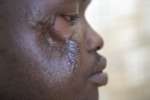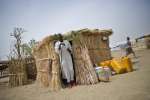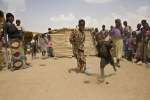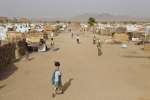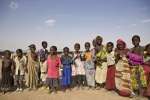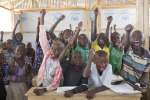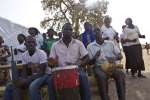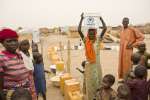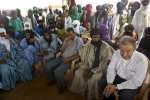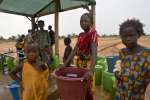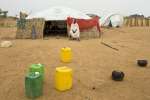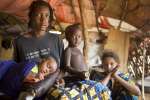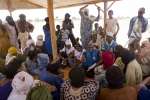High Commissioner's Closing Remarks to the 64th Session of UNHCR's Executive Committee
Statements by High Commissioner, 4 October 2013
Palais des Nations, Geneva 4 October 2013
Edited version of delivered remarks
Excellencies, Ladies and Gentlemen,
First of all, I would like to express my deep gratitude: to the Chairperson, to the Bureau, and to all those in UNHCR and in the Palais – especially the interpreters – who have worked hard to allow this session of the Executive Committee to be successful. I want to convey a very special expression of gratitude to all the delegations, as well as the NGO community and the participants from the UN family, for their extremely important contribution to the success of our work and for the excellent atmosphere in which this debate took place. This is the atmosphere the world needs today. There are so many conflicts, and the international community is paralyzed in so many situations, with difficulties to prevent, address and resolve conflicts, with difficulties to come together and to solve some of the most challenging problems of our time, including climate change and many others. I believe that if the atmosphere we had at this meeting – this sense that despite the differences among countries we are all united for a noble cause and for very vulnerable people – if this atmosphere could always prevail in the international community, the world would be better and we would not be facing such dramatic refugee and displacement situations.
This atmosphere was essential for this High Level Segment, which took place at a very critical moment of the Syrian crisis, and dealt with problems that are inevitably divisive. Because of it, the event took place with a very strong sense of a common purpose, and led to a unanimous statement of support for solidarity and burden-sharing with the refugee hosting countries. This is an important precedent for future Executive Committees that could focus on other crises in the world.
This positive atmosphere also allowed for this year's EXCOM Conclusion to be approved. Civil registration seems to be an obvious thing, and it is a basic essential right that people should have legal recognition and a document to demonstrate that they exist. But everything has different interpretations in different parts of the world, and our discussions can sometimes be affected by many political divisions. The fact that all that was put aside, and we were able to come together on a conclusion like this, is a demonstration of a sense of unity that provides UNHCR with the best possible support and encouragement to do everything possible for the people we all care for.
We live in difficult moments. The combination of an extremely dramatic crisis like the one in Syria with all the others that have multiplied in the recent past is putting our organization and the whole of the international humanitarian community under enormous stress. Sometimes it is difficult to see what is going to happen, how these crises are going to evolve, and whether or not there is light at the end of some of these tunnels.
At these times, I am reminded of the words of one of the fathers of the European Union, Jean Monnet, who once said: "Je ne suis ni optimiste, ni pessimiste, je suis déterminé." I think we have to have the same approach: We cannot be optimistic, we should not be pessimistic, but we need to be determined. Determined to do everything we can to make sure that the people we are supposed to protect, assist and help find solutions for suffer as little as possible and find an end to their plight as soon as possible. It will not be easy, and to many it may not happen for decades, but we need to be determined to do everything we can.
In the intervention of the Danish Refugee Council on behalf of the NGOs, there was a real program of action on what we should be determined about. Determined to respond adequately to humanitarian crises in other parts of the world and not just in Syria. Determined to ensure international protection for those fleeing across borders, including by ensuring access to territory and adhering to the principle of non-refoulement. I believe that what is happening today in Lampedusa is a demonstration of how important it is to be determined in ensuring access to territory where people can find protection. I feel deeply frustrated by the fact that we have no real instrument today to allow those who are in need of protection to find ways to access territories where that protection can be granted, without many of them having to use the channels of smugglers and traffickers, submitting themselves to terrible violations of human rights and, in many circumstances, even paying for it with their lives in situations where no one can rescue them. There is something fundamentally wrong with this, and my appeal is for states to come together, and for international organizations to support, to find ways to effectively crack down on smugglers and traffickers, but also to protect the victims and to allow people fleeing to have access to protection without having to risk their lives and suffering such brutal violations of their human rights.
The third point of the Danish Refugee Council statement was a call for a commitment to eliminate statelessness. There is a very strong link between birth registration and statelessness. It is absolutely unacceptable to have people who do not have a country to call their own. If statelessness leads to discrimination, massive violations of rights, and forces people to flee and perish in the sea as we have seen with the Rohingya, we understand how much we need the total commitment of the international community to eradicate statelessness.
Other points we should be determined about, as the NGOs reminded us, are the following:
-
to promote legal frameworks, policies, funding and coordination for internally displaced persons,
-
to be determined to better support refugees and internally displaced persons living in urban areas and other non-camp settings,
-
to be determined to better support host communities,
-
to be determined to maintain the commitment to age, gender and diversity sensitive programming,
-
to be determined to fight against arbitrary detention,
-
to be determined to more systematically support local partner capacity building, and
-
to be determined to fully apply the principles of partnership.
We took very good note of all the observations made, both during the High Level Segment and the general debate. These included the need to have a solutions approach since the very beginning of displacement. And the need to establish a solid bridge between relief and development, to bridge the gap that Madam Ogata, a very important reference of this organization, already mentioned decades ago. I also heard a very clear message about the need for solidarity and burden-sharing in a world where 80% of the refugees live in developing countries. And about the need to strengthen partnership and to have UNHCR fully engaged in the so-called Transformative Agenda and in mechanisms of effective coordination of humanitarian action.
Allow me to say a few words on coordination. For us, it should always be light, nimble, flexible, and not hierarchical, bureaucratic and rigid. And this, I think, is a concern for all the actors involved in coordination mechanisms within the UN system and the broader humanitarian community. Coordination needs to be an added value for delivery and not a form of increasing bureaucracy or a struggle for power.
On the other hand, there was a very clear message from many delegations on the need to preserve the integrity of the mandate of the High Commissioner and of the Office. I sometimes feel in my discussions even within the UN system that many people who talk about these things have not read the 1951 Convention and the Statute of the Office. Just to give you an example: Many people call me the High Commissioner of UNHCR. It is as if I was calling Ambassador Arango Olmos the Ambassador of the Embassy of Colombia, and not the Ambassador of Colombia. I never correct that, and we even use UNHCR as the acronym for the organization, because it is easier for communication with the public. But indeed, I am the United Nations High Commissioner for Refugees, and what we call UNHCR is the Office of the United Nations High Commissioner for Refugees. And there is a mandate of the High Commissioner, and there is a mandate of the Office. In many debates there is a basic ignorance about what is established in international law and about the responsibilities and the lines of accountability we have. This includes my direct line of accountability to the General Assembly and the responsibilities I have to assume together with the Office in the coordination of refugee response, in close cooperation with States. Let us not forget that the first responsibility of refugee protection lies with States, as it is clearly outlined in the 1951 Convention from the preamble onwards.
I also took very good note of the observations delegations made on the need to ensure improvements in transparency, in accountability and in oversight in UNHCR. This is a priority for us, and it is also a dilemma. On the one hand, we are growing in our activities, on the other hand we need to remain slim as an organization, not spending on ourselves what needs to be spent on the people we care for. This balance is not always easy to find. But we are determined to look systematically into the gaps that exist in relation to oversight, accountability, transparency, and in several other areas in which our action needs to improve, and to fill those gaps without creating a bureaucratic monster. Such a monster would only be a grinding machine of the resources we so desperately try to find for our people of concern and for supporting states that are carrying the heaviest burden in the protection of refugees.
In conclusion, we have another year of challenging operations ahead of us, but we are going to tackle it with our hearts full of enthusiasm, thanks to what was an extremely pleasant, effective, and dedicated meeting of our Executive Committee. Thank you very, very much for this supplement of energy that you have given all of us. My colleagues and I will to our best to deserve your exceptional commitment during this EXCOM session.












